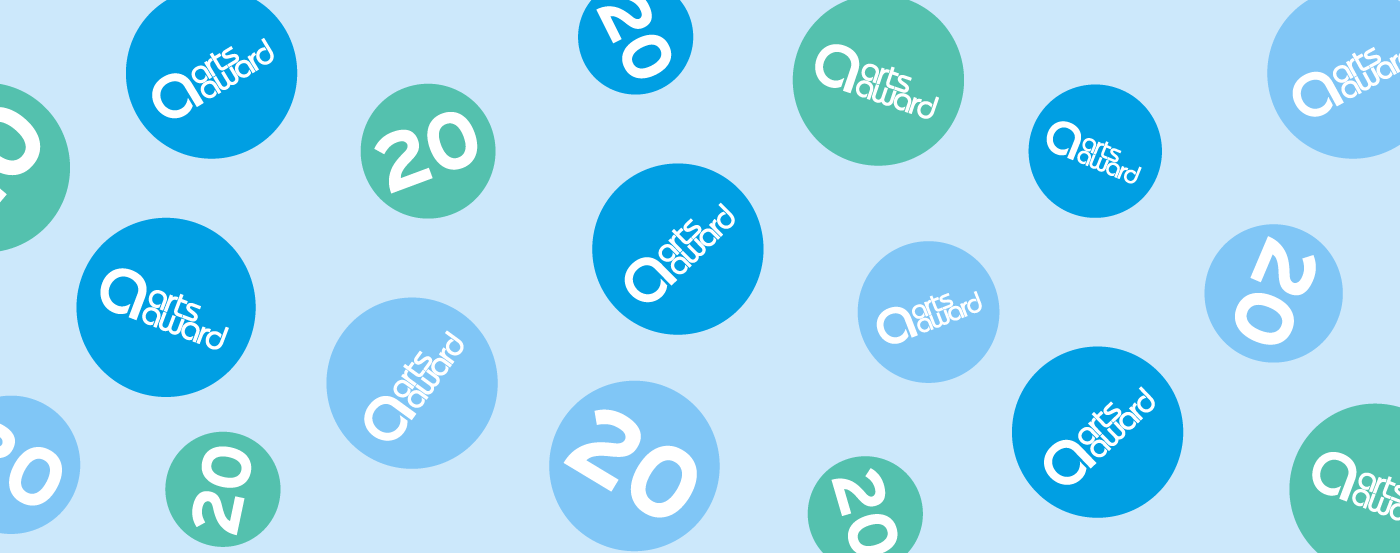
Celebrating Arts Award at 20 and its place in music and drama education
BY: Natalie Christopher
12 November 2025
It’s not often we talk about Arts Award on the Trinity College London Music & Drama blog – after all, it has its own dedicated site for sharing news, support and case studies – but, as our unique arts-based qualification turns 20, we wanted to recognise and celebrate its achievements and place within music and drama education.
What is Arts Award?
In case you’re completely new to it, Arts Award is a range of qualifications designed to recognise young people’s participation in the creative arts and develop of leadership skills. Offered by Trinity in association with Arts Council England, Arts Award open to anyone aged 25 and under and can be worked towards in any art form from music, drama, painting and dance to cake decorating, animation, computer game design and millinery. Offered at five levels (Discover, Explore, Bronze, Silver and Gold) with UCAS points attached to the highest, young people are supported by trained Arts Award advisers within schools, arts organisations and venues, youth centres and home-schooling services to develop a portfolio of evidence documenting their journey.
How is Arts Award used in drama settings?
Drama activities are a natural fit at all levels of Arts Award, from Discover through to Gold. Drama games or activities, exploring the work of a drama practitioner or playwright, school plays or productions, and trips to the theatre, can all play a part in Arts Award delivery. If you’re school-based, Arts Award can be embedded during curriculum time in Drama or English lessons or run as an after-school drama activity. Theatre companies and weekend performing arts academies also use Arts Award to accredit the drama activities they already offer.
Arts Award provides a measurable way to demonstrate progress in English and Drama, with students opting to work towards Silver or Gold Arts Award as an alternative to GCSE/A Level Drama or graded drama exams. Arts Award can also act as a pathway to, or inspiration for, studying Drama at GCSE and beyond with many schools opting to deliver Bronze Arts Award in Key Stage 3. Silver and Gold can act as an excellent complement to those who are studying English and Drama at GCSE or A Level, providing skills development opportunities as well as personal and professional development opportunities outside of school.
A drama-based Arts Award can also work really well in SEND or alternative provision settings thanks to its flexible approach, like in this case study: The Deaf Academy go for Gold!
Furthermore, Arts Award provides a way to accredit other theatre or performance related skills that can be harder to assess elsewhere, such as technical theatre skills like lighting or sound, or even playwriting. Take a look at these blog posts for some ideas:
Arts Award in Technical Theatre
Exploring drama and theatre skills through Arts Award
Arts Award Bronze and playwriting
Lastly, Arts Award can be linked to other programmes or partnerships you may be exploring such as the Coram Shakespeare Schools Foundation.
How is Arts Award used in music settings?
One of the key benefits of Arts Award is that it provides recognition for areas of music that are not typically represented in the traditional graded music exam system. That means that, through Arts Award, young people can gain a qualification in any instrument, discipline or style. So, whether you’re working with an amazing steel pans band, an up-and-coming music producer, or a Stormzy inspired Grime artist, Arts Award can be used as a platform to develop and document their skills, introduce them to different artistic influences, and build on their communication and leadership skills.
Arts Award is really popular in schools too. In primaries, Discover and Explore levels can be embedded into whole class instrumental lessons – check out our blog post, Capturing the joy of Whole Class Instrumental Teaching through Arts Award, where staff from Music Partnership North share their experiences of delivering in this way. Alternatively, Discover has also been integrated into broader arts projects, as Montem Academy did, incorporating African drumming into their arts week, inspired by the book Akimbo’s African Adventures.
In secondary schools, Bronze Arts Award can be used as a bridging activity for the incoming Year 7s, or as a foundation for preparing students for GCSE music. Alternatively, Silver and Gold levels are sometimes used to support musical learning where GCSE or A Level music is not able to be offered.
In SEND schools and alternative provision settings, Arts Award’s flexible approach to evidencing can be really beneficial. Young people can really play to their strengths here. For example, those who can express themselves verbally but not in writing can use video or audio recordings to document what they have done. If they are more in-tune with digital tools, they can create evidence using social media sites, YouTube, SoundCloud, GarageBand etc. (making sure it is done safely, of course). Or, if working with young people with more profound disabilities, typically at the lower levels of Award, non-verbal forms of communication can be utilised and recorded, or transcriptions can be provided by the adult/s working with them. For more ideas on how you can develop Arts Award projects around the needs of your young people, the following blogs might be useful:
For Music Education Hubs and Services, in addition to supporting schools with their delivery as outlined above, there are a myriad of ways Arts Award can support their activities. Why not hold an open day where prospective students can come try out the instruments and achieve their Discover in a day? You could embed Arts Award into projects run with hub partners, or support older students working towards their Silver or Gold awards by providing volunteering opportunities at your music centres.
Lastly, don’t forget to check out our partnerships with BBC Ten Pieces, Charanga, Music for Youth and Out of the Ark to find out how their resources and events can be used to support your Arts Award delivery.
Would you like to chat further about how Arts Award can work in your setting? We have lots of information on our website or, to speak to a member of the team, you can contact us at artsawardenquiries@trinitycollege.com.

.jpg)
.png)

Comments & Replies